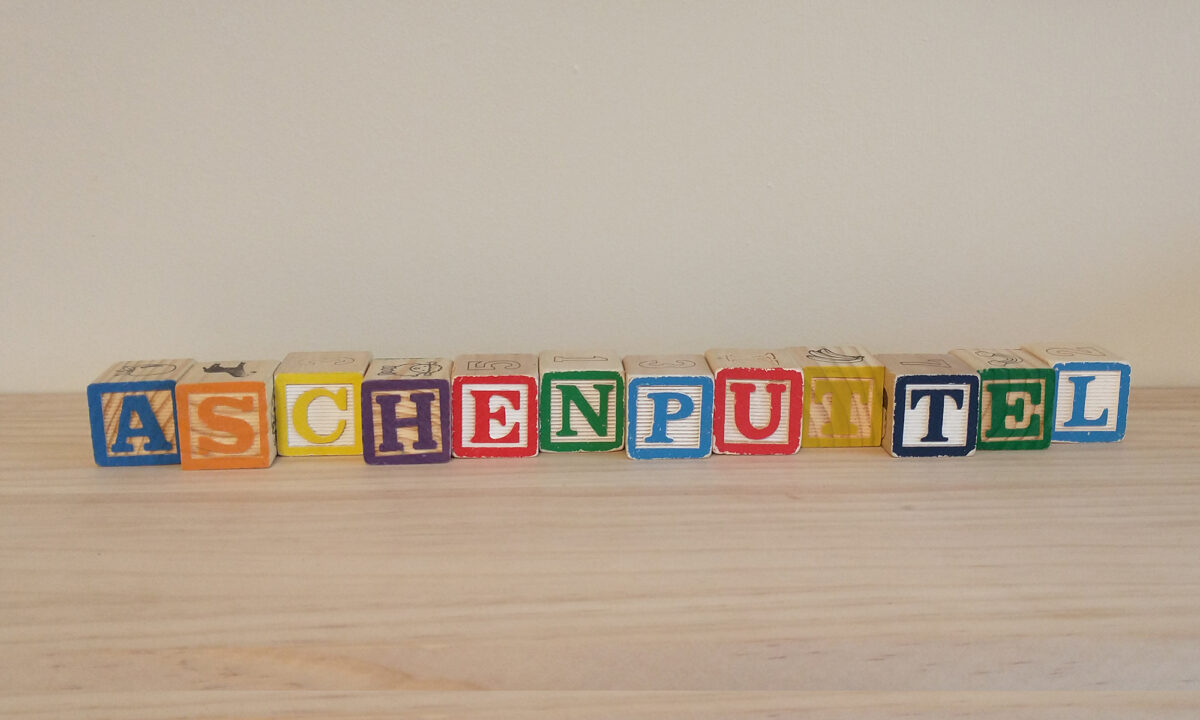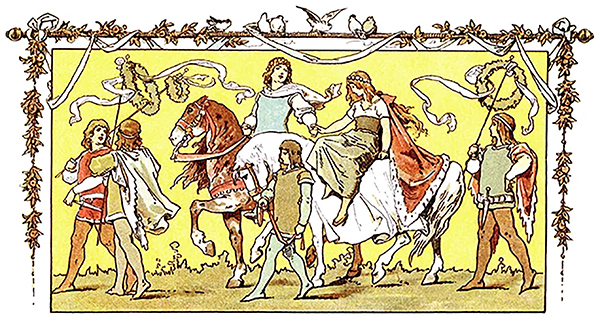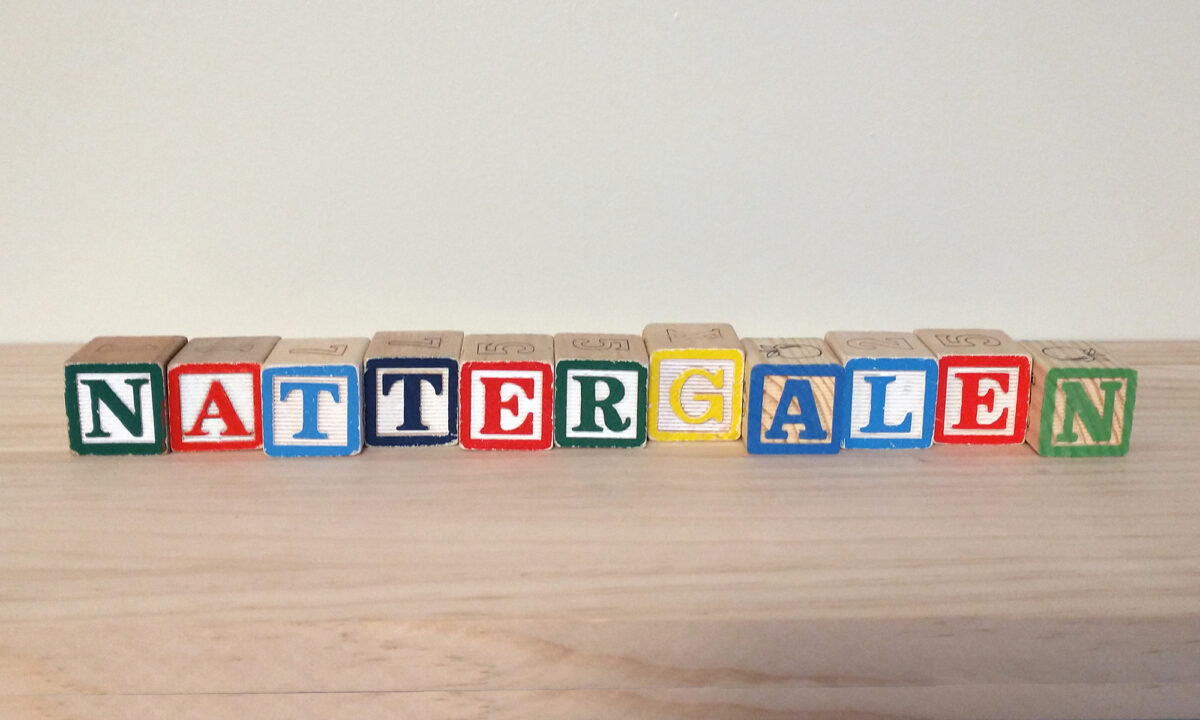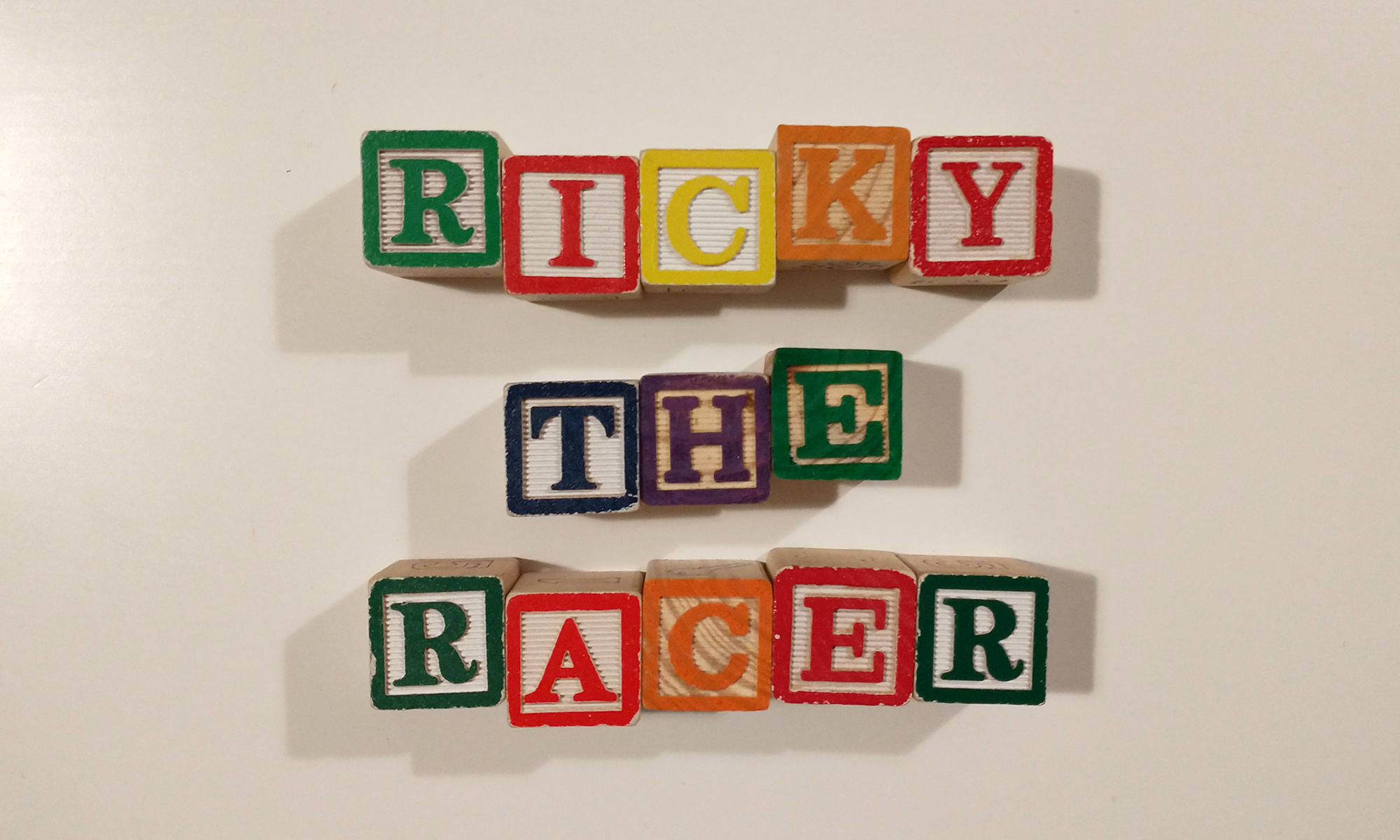This is a presentation of “Aschenputtel” as published in the 1819 second edition of Kinder- und Hausmärchen by Jacob and Wilhelm Grimm. Translated and performed by T.Q. Townsend. This audiobook may be freely used for non-profit educational purposes.
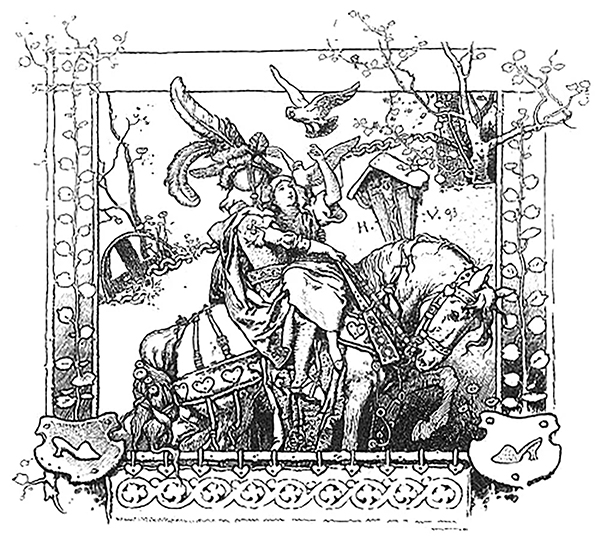 Illustration: Hermann Vogel
Illustration: Hermann Vogel
The audiobook is also available on YouTube:
Aschenputtel (1819)
Translated by T.Q. Townsend
The wife of a rich man fell ill and realized she was about to die. She called her only daughter to her bedside and said to her: “Keep your faith and be a good girl. Then God will bless you and I will do my best to look down from heaven and watch over you.” Then the mother closed her eyes and died.
Every day, the girl went to her mother’s grave and wept. She remembered to be pious and good, just as her mother had told her. The winter snows came and covered the grave like a white blanket, and when the summer sun came and took it away, the man took another wife.
The new stepmother had two daughters that she brought with her, but while their faces were fair, their hearts were ugly. Then times became hard for the poor girl.
“Why is this useless thing in the room?” the new ladies asked. “Whoever eats bread should earn it first. Away with this scullery maid,” they laughed, leading the girl into the kitchen. She was given the heaviest work to do, getting up early in the morning to carry water, make the fires, cook, and wash. The stepsisters tormented her, mocked her, and threw the peas and lentils into the ashes, so that she had to pick them all out and clean them again. In the evenings, when the poor girl was tired, she had no bed to sleep in, so she would lie down in the ashes by the hearth to keep warm. Soon she became so dirty and dusty that the stepsisters called her Aschenputtel.
The father prepared one day to go to a market town, and he asked his two stepdaughters what gifts they would like him to bring. “Beautiful clothing,” said one sister. “Sparkling gems,” said the other.
“And you, Aschenputtel?” asked the father. “What do you want?”
“Father, all I want is the first twig that knocks against your hat on the way home,” Aschenputtel answered.
The Father rode away to the market, and as he rode through a thicket on the way back, a hazel tree brushed against him and knocked off his hat. So he broke off a twig and added it to the bundle containing lovely gowns and fine jewels. When he got home he gave the lovely gifts to his stepdaughters and handed the twig to Aschenputtel.
Aschenputtel took the bit of hazel and went to her mother’s grave. She planted the twig in the dark soil and wept so much that the tears spilled all over the green leaves. The cutting took root and soon became a beautiful tree. Aschenputtel visited the grave three times every day to weep and pray. Every time a little bird would visit the tree, and it had the power to give her anything she needed.
It happened that the king declared that there would be a three-day festival, during which his son would choose a bride. The two stepsisters were invited. They called Aschenputtel, saying, “Comb our hair. Brush and buckle our shoes. We will go and dance at the king’s ball.”
Aschenputtel wished with all her heart that she might go too, and begged her stepmother that she might be allowed to do so.
“You, Aschenputtel?” sneered the Stepmother. “You have nothing fit to wear. You shouldn’t be allowed to attend, no matter how badly you want to go. But I’ll tell you what. If you can sort and clean these lentils in two hours, I’ll let you go to the ball.” And with that, she threw a bowl of lentils into the ashes.
As soon as the Stepmother was gone, Aschenputtel went to the garden door and cried out:
“You sweet little doves, you lovebirds! All you birds under the heavens, please help me! Put the good ones in the pot and the bad ones in your crop!”
Two white doves fluttered through the kitchen window. Then came the lovebirds, and finally many little birds flocked down from the sky and went down to the ashes. The birds nodded their heads and began their work. Pick, pick! Pick, pick! They threw all the good grains into the pot, and swallowed the hard ones as a reward. Hardly an hour had passed when the work was all done and the birds fluttered away. Aschenputtel brought the pot of clean lentils to her Stepmother, smiling because she believed that now she would be allowed to come along to the ball.
But the stepmother only sneered “No, Aschenputtel. You have nothing to wear and may not go to the dance.”
Aschenputtel began to weep, and then the Stepmother said, “I’ll tell you what. If you can pick out two bowls in the next hour, I’ll change my mind.” The Stepmother flung two bowls full of lentils into the ashes, thinking to herself that Aschenputtel would never manage the task.
As soon as the Stepmother had gone, Aschenputtel hurried once more to the back door and cried out:
“You sweet little doves, you lovebirds! All you birds under the heavens, please help me! Put the good ones in the pot and the bad ones in your crop!”
Once again two white doves fluttered through the kitchen window. Then the lovebirds came back, and finally the little birds flocked down from the sky and went down to the ashes. The birds nodded their heads and began their work once more. Pick, pick! Pick, pick! They threw all the good grains into the pot, and swallowed the hard ones as a reward. Before half an hour had passed, all the work was done and the birds flew away.
Aschenputtel brought the bowls to her stepmother, filled with hope that she could come along. But the stepmother only said, “It’s useless. You can’t come with us. You have nothing to wear. You can’t dance; we would be ashamed to be seen with you.”
And then the stepmother and her daughters went away to the ball. Once she was all alone, Aschenputtel went to her mother’s grave under the hazel tree and called out:
“Shake, shake, little tree! Gold and silver give to me!”
Then the little bird perched among the hazel branches threw down a gown made of gold and silver cloth, and a pair of slippers embroidered with silk and silver. Aschenputtel put on the lovely clothing and went to the festival. Her stepsisters and stepmother did not recognize her, thinking the lovely, richly dressed maiden must be some foreign princess. They never imagined it could be Aschenputtel, who they believed was lying in the ashes at home.
As soon as he saw Aschenputtel, the king’s son ran to take her by the hand and asked her to dance. He spent the entire evening by her side and would dance with no one else. If anyone else came to ask Aschenputtel to dance, the prince would tell them, “she is my partner!”
Aschenputtel danced and danced until it was time to go home. The king’s son begged, “let me escort you home,” wishing to know which family the beautiful girl belonged to. But as they neared her house, Aschenputtel managed to slip away and ran to hide in the dovecote. The king’s son waited until the father came home and told him about the mysterious girl who was hiding in the birds’ house.
The father wondered to himself if the maiden were Aschenputtel, but he said nothing. Instead he called for an axe and a pickaxe and cut the dovecote in two. But there was nobody in it. When the family went into the house, they saw Aschenputtel lying among the cinders in her old dirty clothes, with her dim oil lamp hanging by the chimney. She had managed to slip out the other side of the dovecote, return the beautiful clothing to the bird sitting in the tree over the grave, and return to the kitchen in her old gray gown before anyone could see her.
The next day, after the father, stepmother, and stepsisters had gone away to the ball, Aschenputtel returned to the hazel tree and called out:
“Shake, shake, little tree! Gold and silver give to me!”
Then the little bird threw down an even more splendid dress than the one from the day before. When Aschenputtel arrived at the ball, everyone was amazed at her beauty. The king’s son had been waiting for her, and when he saw her he took her by the hand and danced with her only. If anyone else came to ask Aschenputtel to dance, the prince would tell them, “she is my partner!”
When evening came and it was time to go, the King’s son tried to follow her again, but she slipped away and fled into the garden behind her house. There stood a beautiful, tall pear tree full of delicious fruit. Aschenputtel climbed it quickly so that the King’s son could not see her anymore. The prince waited until the father came home and said to him, “The mysterious maiden escaped from me. I think she jumped into your pear tree.”
The father wondered once again if the maiden were Aschenputtel, but once again he said nothing. Instead he sent for an ax and cut down the pear tree, but there was nobody in it. When the family went inside, they found Aschenputtel lying by the fireplace as usual. She had jumped down from the tree on the other side, returned her lovely gown to the bird sitting in the hazel tree, and put her old gray dress back on before anyone could spot her.
On the third day, when the father, stepmother, and stepsisters had gone to the ball, Aschenputtel returned to her mother’s grave and said to the little tree:
“Shake, shake, little tree! Gold and silver give to me!”
And then the bird threw down a dress that was more magnificent than any that had ever been seen, with slippers made all of gold. When Aschenputtel arrived at the ball, everyone was so amazed that they could not even speak. The king’s son danced with Aschenputtel alone, and for a third time if anyone else asked her to dance, he would say right away: “She is my partner.”
When evening came, Aschenputtel took her leave and the king’s son begged to escort her home. She sprang away, hoping to escape as before. But as she fled the palace, her left shoe was lost, for the king’s son had ordered that the stairs be coated with pitch. The king’s son retrieved the shoe. The next day he issued a declaration which announced, “the one who fits this golden slipper shall be my wife!”
When the stepsisters heard this, they were very happy, for they had beautiful feet. When it was her turn to try, the elder sister went into her room with the shoe while her mother stood by. But the slipper was too small for her, and her big toe stuck out.
The stepmother handed her daughter a knife and told her, “cut off your toe. When you’re queen, you won’t need to walk anymore.”
And so the girl cut off her toe and squeezed her foot into the shoe. Then she went to see the king’s son. Believing he had found his bride, he lifted the elder sister onto his horse and began to ride away with her. But on the way out they passed the hazel tree growing over the grave, and two doves sitting there cried out:
“Turn and see! Turn and see!
A bloody shoe! How can that be?
The slipper doesn’t fit at all.
Go back! Find your true bride from the ball!”
The king’s son looked down and saw the blood spurting from the foot. He turned his horse around and brought the false bride home.
“This isn’t the right one. Have the other sister try on the shoe,” the king’s son ordered.
And so the younger sister took the golden slipper up to her room to try it on. But her heel was too big, and it did not fit. Then her mother handed her the knife and said, “Cut off your heel. When you’re queen, you won’t need to walk anymore.” And so the girl cut off a piece of her heel and squeezed her foot into the shoe. Then she went to see the king’s son. Believing that he had at last found his true love, he lifted the younger sister onto his horse and began to ride away with her. But once again, as they passed the hazel tree growing over the grave, the two doves cried out:
“Turn and see! Turn and see!
A bloody shoe! How can that be?
The slipper doesn’t fit at all.
Go back! Find your true bride from the ball!”
The king’s son looked down and saw that so much blood was coming out of the shoe that it had dyed the girl’s stockings quite red. He turned his horse around and brought the false bride home.
“She’s not the right one either,” he said. “Isn’t there another daughter here?”
“No,” replied the father. “There’s only one nasty little cinderwench that my first wife left behind when she died, but she couldn’t be your bride.”
The king’s son insisted on seeing Aschenputtel, but the stepmother refused, pleading, “Oh, no, she’s much too dirty to be seen by you.”
But at last the king’s son ordered that the girl be presented to him. When she heard about her royal visitor, Aschenputtel washed her hands and face, then went and bowed before the king’s son. He gave her the golden slipper. She slipped her heavy boot from her left foot, and then stepped into the golden shoe. She stood wearing it as if it had been made for her alone. She bowed her head to him, and at last the king’s son recognized her face.
“This is my true love!” he declared.
The stepmother and stepsisters were both terrified and pale with anger. The king’s son put Aschenputtel on his horse and rode away with her. As they passed the hazel tree, the two doves called out:
“Turn and see! Turn and see!
No blood in the shoe will be
The fit is perfect – can’t you tell?
Now there will be wedding bells!”
And as they finished their song, they both flew down and sat upon Aschenputtel’s shoulders, one upon the right and the other on the left.
On the day of Aschenputtel’s marriage to the king’s son, the stepsisters came, hoping to get something for themselves out of this happiness. The eldest stood at the right of the church door and the youngest on the left. When Aschenputtel and the King’s son went into the church, the doves pecked out an eye from each stepsister. When the couple came back out again, the doves pecked out their other eyes. And so they were punished with blindness for their wickedness.

